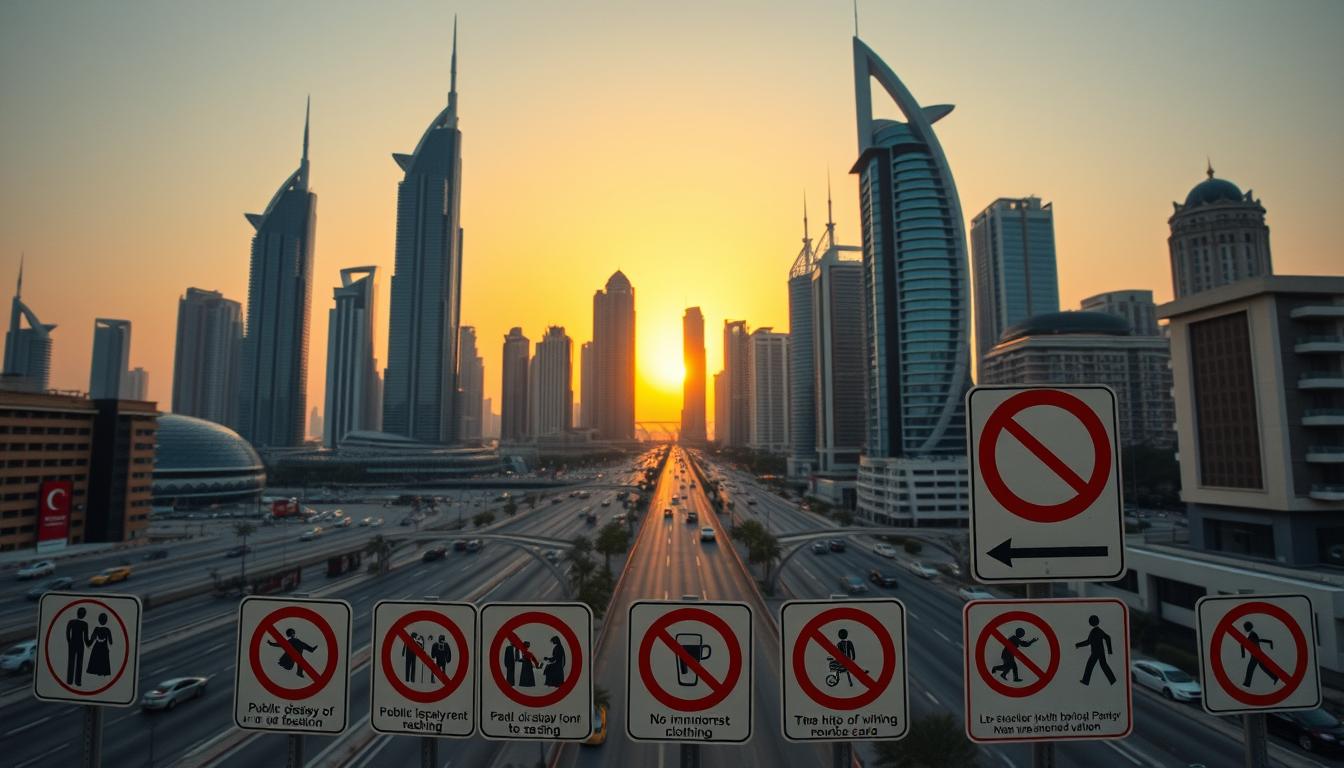
- 614 Views
- 5 Min Read
- (0) Comment
Heading to Dubai can fill you with excitement and a bit of worry. This city’s amazing skyline and deep culture can draw you in. But, learning about local customs is key to enjoy and respect your time there. Some things that are okay elsewhere might not be in Dubai. So, what should you not do there? It’s smart to know these tips to make your trip smooth.
Paying attention to how you act and dress is important. It shows respect and helps you connect with locals. Remember, these rules reflect a culture that values its heritage. For more tips, take a look at this Dubai travel guide. It can help you avoid mistakes.
Key Takeaways
- Understand the cultural norms to fully enjoy your visit.
- Steer clear of public displays of affection.
- Maintain respect when it comes to food and drink, especially during Ramadan.
- Dress appropriately and avoid revealing attire.
- Be mindful of language and gestures that may offend.
- Respect privacy and seek permission before taking photos of individuals.
- Familiarize yourself with local laws to avoid misunderstandings.
Understanding Dubai's Cultural Etiquette
In Dubai, knowing the local etiquette is key. It lets you enjoy the city and respect its traditions. By understanding customs like Ramadan and showing hospitality, you make a better environment for everyone. It’s important to know what’s okay and what’s not.
Respecting Local Customs
Knowing Dubai’s rules makes your visit better. When you respect the locals, your experience is richer. Avoid talking about religion or politics in public. Knowing what customs to avoid helps you get along with Emiratis.
Dress Code: What to Wear and What to Avoid
Dubai’s dress code is about modesty but it’s still quite open. Visitors should cover their shoulders and knees in public, mainly where locals go. At the beach or pool, swimwear is fine but cover up after. Dress wisely to avoid drawing negative attention.
Appropriate Behavior in Public Spaces
Your behavior is just as important as your dress. Public affection isn’t well-seen and could cause issues. Be calm and polite, especially in public transport. This makes your visit smoother.
While eating out, respect the local dining customs. Avoid eating or drinking in public during Ramadan, unless in specific spots. For more on local customs, check out this link.
What are the don'ts in Dubai?
When you visit Dubai, you’ll find a mix of old traditions and new living. It’s important to act carefully to respect the local way of life. Here are some key things to keep in mind.
Avoid Public Displays of Affection
In Dubai, showing affection in public is not taken lightly. Things like kissing or even holding hands can get you in trouble. The culture values modesty and following these rules shows respect for local customs.
Handling Food and Drink Respectfully
Ramadan is a special time in Dubai, and there are rules about eating in public. It’s seen as rude to eat or drink in public during daylight in Ramadan. Be mindful of those fasting around you, even outside of Ramadan. Always offer food politely to respect Dubai’s traditions.
Language and Gestures to Avoid
The language in Dubai is diverse. Yet, it’s important to not use bad words or offensive gestures. Be respectful when talking to locals. If you need help, just ask nicely. Knowing what gestures to avoid helps avoid any bad feelings.
| Area | Do’s | Don’ts |
|---|---|---|
| Public Displays of Affection | Maintain a professional demeanor. | Avoid any form of physical affection. |
| Handling Food | Respect meal times during Ramadan. | Do not eat or drink in public during fasting hours. |
| Language and Gestures | Use polite language, and ask for help respectfully. | Avoid swearing and rude gestures. |
Conclusion
Learning about Dubai’s culture is key to a great trip. When you know the customs, you really get into what the UAE offers. This includes knowing what not to do, like not being too affectionate in public. It also means you should watch how you speak and act.
This helps you connect better with everyone in Dubai’s welcoming and varied community.
Following Dubai’s customs is important to avoid trouble. It means you won’t face misunderstandings or legal problems. Respecting the local ways improves your trip. It also helps keep Dubai’s reputation for being warm and welcoming.
For a bit of adventure, try local services like Desert Buggy Rental Dubai. They let you see amazing places safely, following Dubai’s rules. Following these tips makes your stay in the city much better and respectful.
FAQ
What are the key cultural etiquette tips I should know before visiting Dubai?
Understanding and respecting local customs is key. Know traditions like Ramadan and be polite with everyone. Don’t talk loudly in public and always respect personal space.
Is there a dress code I must follow in Dubai?
In Dubai, wearing modest clothes in public is recommended. Swimwear is fine at the beach and pools. Just cover up when you’re not there. At religious places, keep shoulders and knees covered.
What should I avoid in terms of public behavior in Dubai?
Public affection, like kissing or hugging, might get you in trouble with the law. Also, avoid being loud or starting arguments in public places.
Are there any restrictions regarding food and drink in Dubai?
Yes, don’t eat, drink, or smoke in public during the daylight of Ramadan. Always be thoughtful about when and how you offer food to locals.
What language and gestures should I avoid while in Dubai?
Bad language, swearing, or rude gestures could have big consequences. Always speak and act respectfully, keeping local cultures in mind.
How should I handle interactions with locals?
Be nice when talking to locals. Stay away from touchy subjects like politics or religion. And if you need help, just ask nicely.
Are there any other behaviors considered taboos in Dubai?
Yes, avoid getting drunk in public, gambling, and saying bad things about the UAE’s leaders, government, or culture.
Categories
- Uncategorized (4)
- Desert Buggy Rental (2,089)
- Dune buggy (4)
- Quad Bike Rental (1)
- Desert safari (1)
- Hot air ballon (2)
- dirt bike (4)
Recent Post
Tags
Alserkal Avenue design Antalya Excursions Australian National Maritime Museum Bali Adventure Activities Bangkok Sightseeing Culinary artistry Date Night in Dubai Dubai Aquarium tickets Dubai fashion influencers Dubai Helicopter Tour Dubai Mall fashion district Dubai Marina Exclusive Desert Safari Exploring Dubai's Past Future of Love Lake Georgia attractions Georgia tourism guide Georgia tour packages Heritage Tours in Dubai Iconic hotel architecture Indian culture experiences Indoor attractions in Dubai 2025 International travel in April Lego-themed attractions Luxury beach destinations Luxury hotels with waterparks Luxury Spa Experience Malaysian holiday seasons Memorable birthday experiences Michelin guide Dubai Milan attractions Paris travel Personalized yacht charters Private yacht cruises Ritz-Carlton Dubai pool Riyadh Tourism Rooftop lounges Dubai Santorini Attractions Seasonal travel guide Top attractions in Georgia Top Gujarati eateries in Abu Dhabi Top outdoor spots in Dubai Top Things To Do in Istanbul Traditional Textiles VIP Desert Safari Experience



